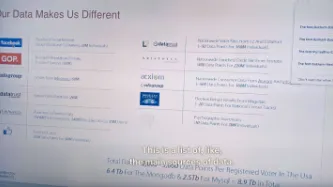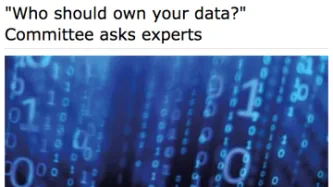Search
Content type: News & Analysis
Yesterday, we found out that Google has been reported to collect health data records as part of a project it has named “Project Nightingale”. In a partnership with Ascension, Google has purportedly been amassing data for about a year on patients in 21 US states in the form of lab results, doctor diagnoses and hospitalization records, among other categories, which amount to a complete health history, including patient names and dates of birth.
This comes just days after the news of Google'…
Content type: Advocacy
Dear Chair and Committee colleagues,
Privacy International is an international NGO, based in London, which works with partners around the world to challenge state and corporate surveillance and data exploitation. As part of our work, we have a dedicated programme “Defending Democracy and Dissent” where we advocate for limits on data exploitation throughout the electoral cycle.
We have been closely following the important work of the Committee. Prompted by the additional evidence provided…
Content type: Examples
In 2017, US Immigration & Customs Enforcement (ICE) announced that it would seek to use artificial intelligence to automatically evaluate the probability of a prospective immigrant “becoming a positively contributing member of society.” In a letter to acting Department of Homeland Security Secretary Elaine Duke, a group of 54 concerned computer scientists, engineers, mathematicians, and researchers objected to ICE’s proposal and demanded that ICE abandon this approach because it would be…
Content type: Long Read
Image Source: "Voting Key" by CreditDebitPro is licensed under CC BY 2.0
Democratic society is under threat from a range of players exploiting our data in ways which are often hidden and unaccountable. These actors are manifold: traditional political parties (from the whole political spectrum), organisations or individuals pushing particular political agendas, foreign actors aiming at interfering with national democratic processes, and the industries that provide products that …
Content type: News & Analysis
Earlier this month, Brunei attracted international condemnation for a new law that will make gay sex punishable by death. While this is clearly abhorrent, Brunei is not the only country with explicit anti-gay laws.
Homosexuality is criminalised in over 70 countries around the world. And even in countries where gay sex is legal, such as the US, the LGBTIQ+ community still faces discriminatory surveillance and profiling by law enforcement agencies.
Through using the Internet and mobile apps,…
Content type: News & Analysis
We found this image here.
Today, a panel of competition experts, headed by Professor Jason Furman, the former chief economic adviser of in the Obama administration, confirmed that tech giants, like Facebook, Amazon, Google, Apple and Microsoft, do not face enough competition.
Significantly, the report finds that control over personal data by tech giants is one of the main causes preventing competition and ultimately innovation.
Privacy International's research has shown clear examples of…
Content type: Examples
In July 2018, Facebook announced it was investigating whether the Boston-based company Crimson Hexagon had violated the company's policies on surveillance. Crimson Hexagon markets itself as offering "consumer insights". Its customers include a Russian non-profit with ties to the Kremlin, and multiple US government agencies. After pressure from civil liberties groups, Facebook put a policy in place in March 2017 barring the use of members' data for the purposes of government surveillance.…
Content type: Advocacy
Privacy International's comments to the Article 29 Working Party Guidelines on automated individual decision-making and profiling are here.
Content type: Long Read
The battle for Kenyan voters’ allegiance in the 2017 Presidential election was fought on social media and the blogosphere. Paid advertisements for two mysterious, anonymous sites in particular started to dominate Google searches for dozens of election-related terms in the months leading up to the vote. All linked back to either “The Real Raila”, a virulent attack campaign against presidential hopeful Raila Odinga, or Uhuru for Us, a site showcasing President Uhuru Kenyatta’s accomplishments. As…
Content type: Press release
A new investigation published today by Privacy International reveals the role of an American data-based digital advertising company in the highly divisive online re-election campaign of Kenyan president Uhuru Kenyatta.
In the run-up to Kenya's presidential election in August 2017, paid advertisements for two mysterious sites dominated Google searches for election-related terms and flooded Kenyans' social media feeds. All linked back to either 'The Real Raila', a virulent attack campaign…
Content type: Examples
In 2016, researchers discovered that the personalisation built into online advertising platforms such as Facebook is making it easy to invisibly bypass anti-discrimination laws regarding housing and employment. Under the US Fair Housing Act, it would be illegal for ads to explicitly state a preference based on race, colour, religion, gender, disability, or familial status. Despite this, some policies - such as giving preference to people who already this - work to ensure that white…
Content type: Examples
A US House of Representatives oversight committee was told in March 2017 that photographs of about half of the adult US population are stored in facial recognition databases that can be accessed by the FBI without their knowledge or consent. In addition, about 80% of the photos in the FBI's network are of non-criminals and come from sources such as passports. Eighteen states supply driver's licences under arrangement with the FBI. In response, privacy advocates and politicians called for…
Content type: Examples
Facebook has come under fire after leaked documents revealed the social media site has been targeting potentially vulnerable children.
The allegations suggest the company is gathering information on young people who “need a confidence boost” to facilitate predatory advertising practices.
Confidential documents obtained by The Australian reportedly show how Facebook can exploit the moods and insecurities of teenagers using the platform for the benefit of advertisers.…
Content type: Advocacy
The feedback in this document was submitted as part of an open Request for Information (RFI) process regarding the document created by The IEEE Global Initiative for Ethical Considerations in Artificial Intelligence and Autonomous Systems ("The IEEE Global Initiative") titled, Ethically Aligned Design: A Vision for Prioritizing Human Wellbeing with Artificial Intelligence and Autonomous Systems.
Content type: Examples
For some months in 2017, in one of a series of high-risk missteps, Uber violated Apple's privacy guidelines by tagging and identifying iPhones even after their users had deleted Uber's app. When Apple discovered the deception, CEO Tim Cook told Uber CEO Travis Kalanick to cease the practice or face having the Uber app barred from the App Store.
External Link to Story
https://www.nytimes.com/2017/04/23/technology/travis-kalabnick-pushes-uber-and-himself-to-the-precipice.html
Content type: News & Analysis
Privacy International’s Data Exploitation Programme Lead was invited to give evidence to the Select Committee on Artificial Intelligence at the U.K. House of Lords. The session sought to establish how personal data should be owned, managed, valued, and used for the benefit of society.
Link to the announcement of the session: https://www.parliament.uk/business/committees/committees-a-z/lords-select/ai-committee/news-parliament-2017/data-evidence-session/
Full video recording of the session:…
Content type: Advocacy
Privacy International's response to the inquiry by the House of Lords Select Committee on Artificial Intelligence.
Content type: Case Study
For those concerned by reporting of Facebook’s exploitation of user data to generate sensitive insights into its users, it is worth taking note of WeChat, a Chinese super-app whose success has made it the envy of Western technology giants, including Facebook. WeChat has more than 900 million users. It serves as a portal for nearly every variety of connected activity in China. Approximately 30% of all time Chinese users spend on the mobile internet centers around…
Content type: Case Study
Political campaigns around the world have turned into sophisticated data operations. In the US, Evangelical Christians candidates reach out to unregistered Christians and use a scoring system to predict how seriously millions these of voters take their faith. As early as 2008, the Obama campaign conducted a data operation which assigned every voter in the US a pair of scores that predicted how likely they would cast a ballot, and whether or not they supported him. The campaign was so confident…
Content type: News & Analysis
Image source: AFP
Earlier this month, the Kenyan daily The Star reported that UK-based data analytics firm Cambridge Analytica had been quietly contracted by President Uhuru Kenyatta’s party in a bid to win himself a second term in office. State House officials were quick to deny the claims, while the company itself issued no comment.
Cambridge Analytica has exploded onto the scene following revelations that its psychometric profiling techniques were used and reportedly played a role in…
Content type: Long Read
Disclaimer: This piece was written in April 2017. Since publishing, further information has come out about Cambridge Analytica and the company's involvement in elections.
Recently, the data mining firm Cambridge Analytica has been the centre of tons of debate around the use of profiling and micro-targeting in political elections. We’ve written this analysis to explain what it all means, and the consequences of becoming predictable to companies and political campaigns.
What does…



















